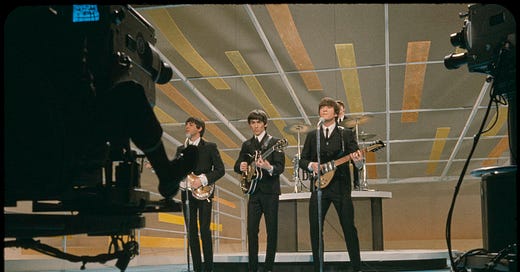When I wrote about “Sgt. Pepper’s” a few weeks ago and put it all the way down at #20, I mentioned that there were Beatles albums that I would put higher on this list. And here we are.
25 Albums I Can't Live Without: #20
This might be the most controversial choice on my entire list. After all, “Sgt. Pepper’s” constantly makes lists of the best albums in rock history — often topping such lists.
“Revolver” was the first album where the Fab Four started to experiment more. They decided that they weren’t going to tour anymore, so they were free to test the limits of studio work since they wouldn’t have to replicate these songs live.
The Beatles considered recording in Memphis, but that plan fell apart. Instead, producer George Martin enlisted young, innovative engineer Geoff Emerick to help with the recordings at Abbey Road. The experimentation paid off.
“Revolver” kicks off with a Beatles first: social commentary. George Harrison wrote “Taxman” as a protest against the UK’s punitive tax system, and the band name-checks PM Harold Wilson and opposition leader Edward Heath.
Harrison also had his first full-blown dive into Indian music with “Love You To”:
Another first was the horn section in Paul McCartney’s Motown homage/love letter to weed, “Got to Get You Into My Life.”
Speaking of McCartney, he brought some of his most elegant songs to “Revolver,” from the string octet of “Eleanor Rigby” to the romance of “Here, There, and Everywhere” to the autobigraphical “For No One.”
McCartney admitted that “Good Day Sunshine” bore the influence of the Lovin’ Spoonful.
Ringo Starr gets his turn at the mic with the beloved “Yellow Submarine.”
And John Lennon captured the zeitgeist of the times with songs like “Doctor Robert” and “And Your Bird Can Sing,” which the media interpreted as a dig at Frank Sinatra, although Lennon said later that the barbs were aimed at McCartney. (But man, oh man, that guitar work on “And Your Bird Can Sing.”)
Just as “A Day in the Life” was the capstone of “Sgt. Pepper’s” as the final track, “Tomorrow Never Knows” closes “Revolver” with the album’s boldest experimentation. From Lennon singing his vocals through a Leslie speaker to the tape loops throughout, “Tomorrow Never Knows” is compelling and unusual. Best of all, it includes some of Starr’s best drumming.
“Revolver” set the stage for further experimentation for the Fab Four, but it also just happens to be an irresistible pop-rock album from start to finish.
Photo credit: Library of Congress, Public domain, via Wikimedia Commons





